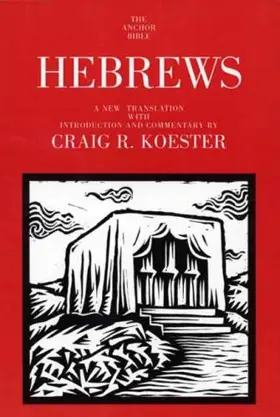

Hebrews
Pages
640
Publisher
Yale University Press
Published
1/1/2001
ISBN-13
9780300139891
One of early Christianity's most carefully crafted sermons, Epistle to the Hebrews addresses listeners who have experienced the elation of conversion and the heat of hostility, but who now must confront the formidable task of remaining faithful in a society that rejects their commitments. The letter probes into the one of most profound questions of faith: If it is God's will that believers be crowned with glory and honor, why are the faithful subject to suffering and shame? Through the stories of Abraham and Sarah, Moses, and Rahab, whose faith enabled them to overcome severe trials and conflicts, and through the story of Jesus himself, whose sufferings opened the way to God's presence for all, the sermon confirms the foundations of the Christian faith.
In a magisterial introduction, Koester presents a compelling portrait of the early Christian community and examines the debates that have surrounded Epistle to the Hebrews for two millennia. Drawing on his knowledge of classical rhetoric, he clarifies the book's arguments and discusses the use of evocative language and imagery to appeal to its audience's minds, emotions, and will. Providing an authoritative, accessible discussion of the book's high priestly Christology, this landmark commentary charts new directions for the interpretation of Epistle to the Hebrews and its influence on Christian theology and worship.
In a magisterial introduction, Koester presents a compelling portrait of the early Christian community and examines the debates that have surrounded Epistle to the Hebrews for two millennia. Drawing on his knowledge of classical rhetoric, he clarifies the book's arguments and discusses the use of evocative language and imagery to appeal to its audience's minds, emotions, and will. Providing an authoritative, accessible discussion of the book's high priestly Christology, this landmark commentary charts new directions for the interpretation of Epistle to the Hebrews and its influence on Christian theology and worship.
Collections
This book appears in the following featured collections.
- Favorite Advanced NT Commentaries by Jeremy Pierce (parableman)
- Recommended NT Commentaries by Denver Seminary Journal
- The Pastor’s Bookshelf by Scot McKnight
- New Testament Commentaries & Monographs by Princeton Theological Seminary
- Nijay Gupta's Top NT Commentaries by Nijay K. Gupta
- Recommended New Testament Commentaries for Evangelical Pastors by Thomas R. Schreiner
Reviews
Currently my number 2 choice on Hebrews, behind Luke Timothy Johnson (NTL). Koester provides a very detailed intro covering history of interpretation and canonical discussions, as well as the various possibilities regarding authorship, recipients' setting, and date. The textual comments cover intertextual pieces, and non-biblical uses of various features and vocabulary carefully. The AYB series has improved considerably over the years, and have become more balanced, provide more useful exposition along with critical examination of the text. This one is not ground-breaking, but solid and reliable.
Standard academic reference from a liberal/secular perspective.
[Full Review]
An important, outstanding commentary on Hebrews.
This book replaces the earlier Anchor volume written by George Buchanan (1972), nearly tripling the size of the commentary. Like many of the early AB commentaries, Buchanan offered a new translation with only a light commentary. One thing I appreciated about the older commentary is that it had a Conclusion, offering several suggestions for authorship, origin, and purpose only after the book has been read exegetically. Most writers wait to writer their introductions last, but publishers always place the introduction (naturally) at the beginning of the book. Koester’s commentary offers a historical perspective absent from other studies. He begins with 63 pages on the “History of Interpretation and Influence.” He divides this introduction into several sub-sections (early church to 600; 600-1500; 1500-1750; 1750-present). This is an excellent overview of how Hebrews has been treated and will aid the reader in understanding what issues are at stake in reading Hebrews. Koester includes a “selected” theology of the book, since there are some any topics which can be covered theologically in Hebrews. The body of the commentary moves through the pericopes by offering a fresh translation, notes on the translation, and a comment on the theology of the section. Greek is treated in transliteration, sources are cited in-text, but a great deal of comparative literature appears in the footnotes as well.
[Full Review]





